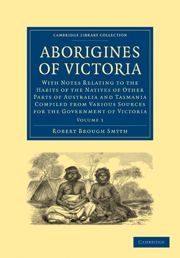 Aborigines of Victoria
Aborigines of Victoria Book contents
- Frontmatter
- PREFACE
- Contents
- LIST OF ILLUSTRATIONS
- INTRODUCTION
- PHYSICAL CHARACTER
- MENTAL CHARACTER
- NUMBERS AND DISTRIBUTION OF THE ABORIGINES
- BIRTH AND EDUCATION OF CHILDREN
- MARRIAGE
- DEATH, AND BURIAL OF THE DEAD
- A NATIVE ENCAMPMENT AND THE DAILY LIFE OF THE NATIVES
- FOOD
- DISEASES
- DRESS AND PERSONAL ORNAMENTS
- ORNAMENTATION
- OFFENSIVE WEAPONS
- DEFENSIVE WEAPONS
- WEAPONS AND IMPLEMENTS OF THE WEST AUSTRALIAN
- IMPLEMENTS AND MANUFACTURES
- STONE IMPLEMENTS
- NETS AND FISH-HOOKS
- METHODS OF PRODUCING FIRE
- CANOES
- MYTHS
- Plate section
A NATIVE ENCAMPMENT AND THE DAILY LIFE OF THE NATIVES
Published online by Cambridge University Press: 05 December 2011
- Frontmatter
- PREFACE
- Contents
- LIST OF ILLUSTRATIONS
- INTRODUCTION
- PHYSICAL CHARACTER
- MENTAL CHARACTER
- NUMBERS AND DISTRIBUTION OF THE ABORIGINES
- BIRTH AND EDUCATION OF CHILDREN
- MARRIAGE
- DEATH, AND BURIAL OF THE DEAD
- A NATIVE ENCAMPMENT AND THE DAILY LIFE OF THE NATIVES
- FOOD
- DISEASES
- DRESS AND PERSONAL ORNAMENTS
- ORNAMENTATION
- OFFENSIVE WEAPONS
- DEFENSIVE WEAPONS
- WEAPONS AND IMPLEMENTS OF THE WEST AUSTRALIAN
- IMPLEMENTS AND MANUFACTURES
- STONE IMPLEMENTS
- NETS AND FISH-HOOKS
- METHODS OF PRODUCING FIRE
- CANOES
- MYTHS
- Plate section
Summary
It is necessary for a tribe to move very frequently from place to place, always keeping within the boundaries of the country which it calls its own–now to the spot where eels can be taken in the creeks; often to the feeding grounds of the kangaroo; sometimes to the thicker forests to get wood suitable for making weapons; to the sea-coast continually for fish of various kinds; and, at the right season, to the lands where are found the native bread, the yam, and the acacia gum. Constantly under the pressure of want, and yet, by travelling, easily able to supply their wants, their lives lack neither excitement nor pleasure. When the head of a tribe, advised by the council of old men, has fixed upon a camping ground at some distance away, notice is given to all the families at early morning. Such things as they require on their journey they carry with them, but property of another kind is secreted in their miams or in the hollows of trees, or under stones, or in some thick patch of scrub. In leaving it they know well that they will find it when they return. Laden with their bags and rugs, and implements and weapons, they wend their way through the forest in small parties: the males generally with the males, the females with the females; and the constant chatter and noise, and sometimes the loud calls of the men, serve to amuse and cheer the tribe on its journey.
- Type
- Chapter
- Information
- Aborigines of VictoriaWith Notes Relating to the Habits of the Natives of Other Parts of Australia and Tasmania Compiled from Various Sources for the Government of Victoria, pp. 123 - 182Publisher: Cambridge University PressPrint publication year: 2010
